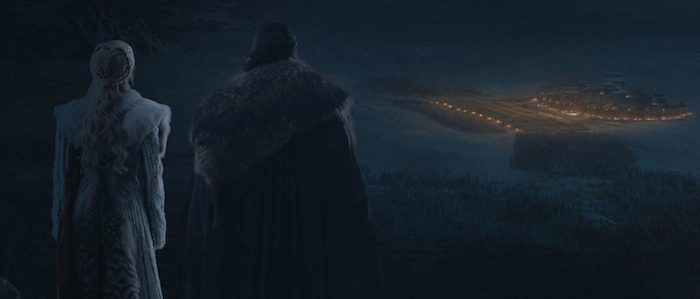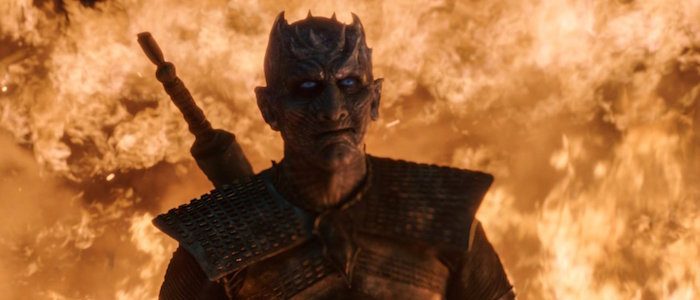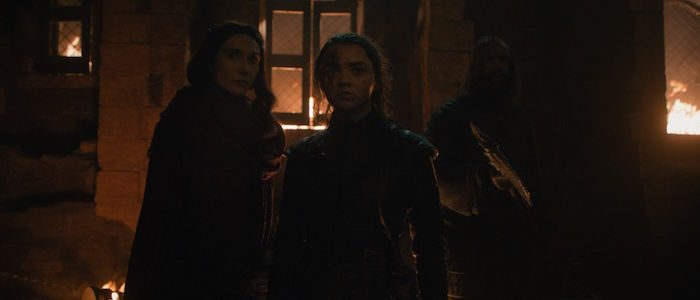
Here is it is. The biggest battle in Game of Thrones history. And it was a huge letdown.
But does the failure of big action mean “The Long Night” itself was a total failure? Not necessarily. Because nestled in that murky brawl were scenes of sublime beauty, unforgettable misery, and triumph that has been years in the making. Let’s sort through this.
The Night is Dark and Full of Bad Editing
If you were on social media in the hours after “The Long Night” aired, you saw the complaints. You saw the memes. You saw the jokes. You saw the mockery. And you saw the anger. Game of Thrones watchers, millions of them, claimed they simply could not follow the battle at the center of the episode. Because, well, it was too dark. These reports were followed by explanations. Maybe the HBO Go servers were slammed to the point where everyone was watching a crummy stream. Maybe viewers’ televisions weren’t calibrated properly. Maybe it was a creative choice, one meant to capture the chaos of the battle itself.
I believe that final part to be accurate, but I also believe the episode itself was a tremendous technical failure and that this particular creative choice undermines everything the episode’s director, Miguel Sapochnik, set out to do. For the record, I watched this episode on the same television on which I watched and enjoyed seasons 6 and 7, a television owned by a friend who takes his calibrations and dark levels very seriously. We watched the cable broadcast, not the stream. Darkness was still an issue. Halfway through the episode, we pressed pause to adjust the brightness because my entire group of watchers could not tell what was happening (leading to much wincing from the television owner, who noted how we were sacrificing a calibrated picture just so we could follow basic action). This has never happened before on this TV and never with a past episode of Game of Thrones.
I imagine we’ll be hearing something official from HBO in the hours or days ahead as they try to control the narrative of the battle no one could see. The battle they have been talking up, hyping up, for close to a year now as the biggest action scene in history. Quite frankly, the marketing department did the episode no favors. Hype is a dangerous thing. Expectations can derail just about anything when they’re aimed in the wrong direction. So let’s strip away the hype. Let’s strip away the expectations. If we had gone into the Battle of Winterfell completely blind, would I still be as disappointed as I am right now?
The answer is yes. The problems with this episode go beyond the choice to shoot almost the entire thing in murky shadows – there’s also the choice to drop a blizzard on top of the action and then fill that blizzard with swirling dragon ash. Combined with the low light, this places all of the action in indecipherable fog. And once again, this clearly seems to be a point. The battle is staged as a horror sequence, with few moments of heroism and even fewer moments of hope. The confusion and the chaos, the fact that no one can see anything and the enemy can come from anywhere, is the point. There’s no denying the intent here, and on paper, it’s fine and frightening way to stage a war against the undead. And it works early on, like when countless thousands of Dothraki ride into the darkness and we watch as their flaming weapons are rapidly distinguished in the shadows. But once the proper fight begins, these chilling moments, where the darkness works in favor of the battle, fade away.
So the problem lies in execution. With visibility already limited, the action itself is cut to ribbons. Incoherent close-ups, wild camera swerves, shots that last for only a handful of frames before cutting away…clearly, the intention with the editing is to place in the audience in the action, to be a part of a battle where everything is out of control. Once again, that’s fine in theory. But when combined with the lack of light and the low visibility, this leads to action that is genuinely impossible to follow.
It is the job of an editor, working with footage supplied by the production crew, to establish the geography of a scene, to let you know where everyone is and their spatial relationship to other characters. The quick-cutting means not knowing whether a dragon is alive or dead. It means not realizing Beric survived his wounds until he suddenly joins other characters in another room. It means having to tell your friend when the credits roll that yes, Gendry actually survived and that was another guy who plummeted to his death, but the quick cutting suggested the incorrect information. Ultimately, the episode’s attempts to create chaos result in actual, unwatchable chaos, 90 minutes of television that are bizarrely incompetent for a series that has otherwise been so magnificently shot for nearly a decade.
Sapochnik himself is no stranger to delivering the series’ trademark spectacle – his “Battle of the Bastards” and “Hardhome” are examples of all of this done right. However, those fights have the benefit of taking place in the daylight, where the fast cutting is assisted by by the mere fact that we can see faces and know who we are looking at.
I’m reminded of a quote from Lord of the Rings cinematographer Andrew Lesnie, who was asked where the light was coming from during the Battle of Helm’s Deep in The Two Towers. His response: “Same place as the music.” Sometimes, a cinematic recreation of a concept is better than an attempt to actually create that very thing. It’s possible to stage chaos. It’s possible to stage chaos and place an audience in it and allow us to understand what we’re looking at. But I wish Game of Thrones knew what Lesnie knew: telling a clear story is the reason we’re all here in the first place and that should always be the number one priority.

What Are We Fighting For?
Let’s pretend for a moment that “The Long Night” was as well-lit and well-edited as previous battles on Game of Thrones. Will the battle itself still measure up against the likes of the Battle of Blackwater, the Battle of the Bastards, and Daenerys’ assault on the Lannister caravan? Quite frankly, no. Each of those fights were huge, yes, but they also were more than characters swinging swords for 90 minutes. Blackwater placed us on both sides of the conflict, made clear the tactics and goals of each side, and then let us simmer as we watched those plans evolve on the battlefield, adapt as each commander out-maneuvered the other. The Battle of the Bastards is a fight where everyone going in has a clear plan, only for everything to not go according to plan, forcing us to suffer alongside the heroes as their strategy fails spectacularly. Daenerys’ assault is rightfully told from the point of view of Jamie and Bronn, and the action revolves around their attempts to survive a perfect ambush, to rally and communicate in the face of overwhelming odds.
What is the actual plan at the Battle of Winterfell? We never hear Jon or Dany shout any orders. Other than a quick signal flare, Davos just hangs out on the top of a wall. Grey Worm seems to be improvising. Everyone else just stands in their flank before quickly retreating. The entire battle for the seven kingdoms seems to be built on the idea of “Well, we’ll gather here and hope for the best.” In a series that has so often luxuriated on the details of military warfare, that delights in smart minds playing the battlefield to their specific advantages, this is not good enough. It could be argued that this is a battle run by green commanders who don’t have much experience, but Tyrion, Jon, Daenerys, Davos, and Grey Worm are all seasoned at this point. They’ve survived too much and know too much. The incompetence from competent characters is genuinely shocking.
At the very least, I hope the show recognizes and points out Jon’s increased uselessness as a field commander – following Hardhome and the Battle of the Bastards, this is the third major battle he’s personally lost, and the second that was only won at the last second because someone more competent showed up. But at least his incompetence is a character trait and something we’ve come to expect. The rest of the episode reduces Brienne, Jaime, Tormund, Gendry and the rest of the crew to glorified extras, putting their backs against walls and letting them endlessly hack zombies to death for the back 45 minutes of the episode, never changing geography, never using Winterfell’s multiple levels to their advantage, and never varying up the monotony of it all. Thank the Seven for the crypt, where we could occasionally cut to escape the repetitive, character-free nonsense in the courtyard. My kingdom for these characters sharing a glance, a moment, anything, during the worst night of their lives. (A handful of characters are excepted from this, and we’ll get there.)
So, other than that, how was the play, Mrs. Lincoln? You know what? Not that bad. When the chaos takes a break, “The Long Night” is actually a damn solid episode of Game of Thrones painfully stretched around a lousy battle.

Deus Ex Melisandre
In a surprise reveal, Melisandre makes good on her promise to return to the north one final time. And just in time, too. Without the red priestess, the battle would’ve been lost. She ignites the blades of the Dothraki. She sets the trench on fire when the Night King uses a blizzard to keep Daenerys from getting it done with dragonfire. And most importantly, she gives a pep talk to Arya Stark at just the right moment, letting the youngest Stark girl save the day and complete an arc that has been brewing since early in season 1.
In many ways, Melisandre’s role in this episode is that of a deus ex machina, with her arriving out of the blue to save the day and make everything right. But this is a case where I’ll allow it. Here is a woman who can see the future in the flames, a powerful sorceress who has dedicated her life to stopping the undead from destroying the world of the living. Of course she would be here. Of course she would defy Jon Snow’s banishment to fulfill her destiny. And of course her destiny isn’t quite what she, and we, thought it would be.
When we first met Melisandre back in season 2, she was working for Stannis Baratheon, convinced that the charisma-free stick-in-the-mud was the Lord of Light’s chosen one, Azor Ahai, the prince who was promised. That ended when Stannis lost his head. Then she thought Jon was the man for the prophecy. Across the narrow sea, some thought it was Daenerys. Some of the character’s best moments, and some of Carice Van Houten’s best work, arose from Melisandre realizing that her visions had failed her. That her god has seemingly left her alone in the dark.
“The Long Night” quietly adds context to what we already knew. Melisandre knew this fight was coming. She knew she had to be there, at the side of Azor Ahai, to save the world from darkness. But she didn’t know whose side she had to stand by. How could she have known that her most important job, the act that saves an entire continent, is to remind young Arya Stark of her very first lesson from her very first teacher?
We’ve seen Melisandre powerful and we’ve seen her humbled. And now, we see her victorious. And the man who hates her the most, Davos, watches as she steps beyond the gates of Winterfell, removes her enchanted broach, and dies the old woman she has been all along. Her watch is ended. Her mission is accomplished. She has done her duty, leaving many innocent bodies and plenty of mistakes in her wake. Now she can rest…and we have to grapple with her complex, bloody legacy.
Continue Reading The Long Night >>
The post ‘Game of Thrones’ Drops the Ball With “The Long Night,” the Worst Battle in the Show’s History appeared first on /Film.
from /Film http://bit.ly/2ZIuKtt
No comments:
Post a Comment